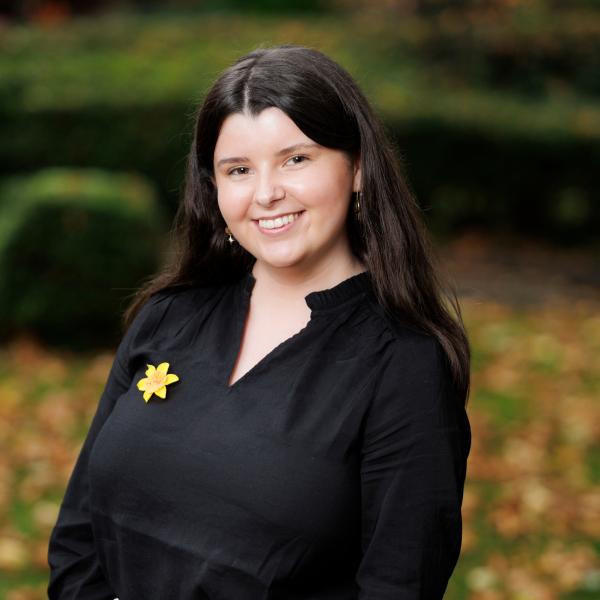Kate Duffy's Cancer Researcher Story
“Prostate cancer spreading to the bone can have a detrimental effect, as the survival rates for metastatic prostate cancer is only at 35% five years after diagnosis."

"My work is looking at understanding how cancer cells know to spread from the prostate to the bone, as that’s where advanced prostate cancer usually spreads to.”
Kate Duffy, 23, from Athlone is a PhD student based in UCD. Her Irish Cancer Society-funded research, titled ‘Investigating the metastatic potential of prostate cancer extra cellular vesicles in patient-derived explants’, looks at understanding why prostate cancer typically spreads to the bones, with the aim of eventually preventing it from occurring.
“Prostate cancer is very common in Ireland and there’s been lots of research into treatment,” says Kate. “Some patients recover from prostate cancer but for others it can come back and spread around their body after treatment. The cancer spreading is what makes prostate cancer a leading cause of cancer-related death in men in Ireland.
“The aim of the project is to understand how prostate cancer spreads to the bone, so we can prevent metastatic prostate cancer. Treatment for primary prostate cancer is very good and making sure that patients don’t have relapses is an important part of the project.”
Kate’s interest in science began when she was in school, as her mother encouraged her to take part in science-based activities and competitions. Kate particularly enjoyed the trouble-shooting aspect of science experiments.
When she was studying for her Leaving Certificate, Kate’s uncle, Tony, passed away after being diagnosed with pancreatic cancer.
“My uncle, Tony, had pancreatic cancer, which is very hard to detect, and usually by the time it has been detected, it has already spread,” says Kate. “He passed away within a year of his diagnosis. That happened when I was in school, and it made me realise that cancer is a huge and complex problem, and all cancers are so different.”
In the summer of 2023, Kate was awarded an Irish Cancer Society Summer Studentship for a project looking at the use of liquid biopsies to detect cervical cancer. This experience cemented her resolve to work in cancer research.
“The Irish Cancer Society Summer Studentship sealed the deal for me – I knew I wanted to work in cancer research then,” she says. “I was involved in a project to do with cervical cancer for that one, and I knew I definitely wanted to stay in cancer research."
“That work was led by Dr Antoinette Perry, and her work is very patient focused, translational and clinically relevant, which really appealed to me.”
One of the other aspects of working in cancer research that appeals to Kate is seeing and understanding the different ways people’s cells respond to cancer and cancer treatment, and how varied it can be.
“Every person is so different, even at a cellular level,” says Kate. “When it comes to treating cancer, there isn’t one solution for everybody. We’re all very different, even though we have a lot in common.
"Every person, and every cancer, is so specific, so it’s important that we understand how things happen so we can use that information to inform the treatments that are used.”
